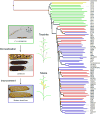Comparative population genomics of maize domestication and improvement
- PMID: 22660546
- PMCID: PMC5531767
- DOI: 10.1038/ng.2309
Comparative population genomics of maize domestication and improvement
Abstract
Domestication and plant breeding are ongoing 10,000-year-old evolutionary experiments that have radically altered wild species to meet human needs. Maize has undergone a particularly striking transformation. Researchers have sought for decades to identify the genes underlying maize evolution, but these efforts have been limited in scope. Here, we report a comprehensive assessment of the evolution of modern maize based on the genome-wide resequencing of 75 wild, landrace and improved maize lines. We find evidence of recovery of diversity after domestication, likely introgression from wild relatives, and evidence for stronger selection during domestication than improvement. We identify a number of genes with stronger signals of selection than those previously shown to underlie major morphological changes. Finally, through transcriptome-wide analysis of gene expression, we find evidence both consistent with removal of cis-acting variation during maize domestication and improvement and suggestive of modern breeding having increased dominance in expression while targeting highly expressed genes.
Conflict of interest statement
The authors declare no competing financial interests.
Figures



Comment in
-
A crop of maize variants.Nat Genet. 2012 Jun 27;44(7):734-5. doi: 10.1038/ng.2326. Nat Genet. 2012. PMID: 22735582 No abstract available.
References
-
- Wright SI, et al. The effects of artificial selection of the maize genome. Science. 2005;308:1310–1314. - PubMed
-
- Chia J-M, et al. Maize HapMap2 identifies extant variation from a genome in flux. Nat Genet. (Accept in Principle) - PubMed
-
- Doebley J, Stec A, Hubbard L. The evolution of apical dominance in maize. Nature. 1997;386:485–488. - PubMed
Publication types
MeSH terms
Associated data
- Actions
Grants and funding
LinkOut - more resources
Full Text Sources
Other Literature Sources
Molecular Biology Databases

